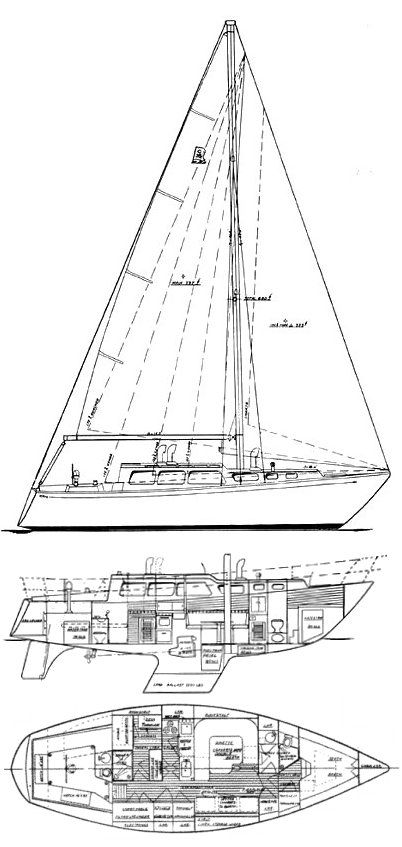The Challenger 38, designed by Howard Stern and built by the American Challenger Yachts Corp. in Wilmington, California, is a robust cruising sailboat known for its sturdy construction and comfortable accommodations. Launched in 1972, this masthead sloop, also available as a ketch, embodies the builder's commitment to durability and seaworthiness, a hallmark reinforced by their innovative unconditional hull guarantee. She was conceived as a capable and reliable vessel for serious cruising, offering a secure platform for sailors seeking stability and comfort over outright speed.
Challenger 38 Information, Review, Specs

- Make
- Challenger
- Model
- 38
- Number Built
- Production Year(s)
- 1972 - ??
The Challenger 38 commenced production in 1972 under Challenger Yachts Corp., a company founded by Howard D. Stern in 1969. The builder was renowned for its exceptionally high standards of construction and notably offered an unprecedented, transferable ten-year unconditional hull guarantee, underscoring their confidence in their vessels' integrity. Production of the Challenger 38 continued until the company ceased operations around 1980. Howard Stern, the designer of this particular Challenger 38, shared his company's ethos of creating structurally sound and reliable yachts. During its production run, the Challenger 38 was available in both masthead sloop and ketch configurations, offering owners options for rig versatility. It is important to distinguish this Challenger Yachts Corp. model from the "Alden Challenger 38," which was a separate design by John G. Alden, built by Halmatic Ltd. in the UK.
Sailing Performance and Handling
With a length overall of just under 40 feet and a waterline length of 34 feet, the Challenger 38 is characterized by its substantial displacement of 24,800 pounds. Her design prioritizes stability and comfortable motion, rather than light-air performance. The sailboat's Sail Area to Displacement (SA/D) ratio of approximately 13.84 indicates that she is a heavy-displacement vessel that may be considered underpowered in very light wind conditions. However, her Ballast to Displacement (B/D) ratio of roughly 0.33, combined with a very high Displacement to Length (D/L) ratio of around 631, points to a boat that is "reasonably stable / stiff and has an excellent righting capability if capsized." This robust build and significant weight contribute to a comfortable ride in a seaway, making her well-suited for extended cruising. The fin keel and skeg-hung rudder provide good directional stability and control, typical of offshore-capable designs of her era.
Accommodations and Layout
While specific interior layouts for the Howard Stern-designed Challenger 38 are not widely detailed in common databases, Challenger Yachts Corp. was known for maximizing interior volume in their designs, as exemplified by the Challenger 32's unusually spacious cabin. The Challenger 38 is noted for having a "comfort value significantly above average," suggesting a generous and practical interior for a boat of her size. Typical for cruisers of the 1970s, the interior likely features a functional arrangement with a V-berth forward, a head compartment, a main salon often with convertible settees, a galley, and possibly a quarter berth. Construction materials would primarily include solid fiberglass for the hull and deck, with interior finishes commonly featuring wood trim and paneling, providing a classic and durable ambiance. Ample storage and good ventilation would have been considerations for a boat designed for comfortable cruising.
Owner's Perspectives
Owners of the Challenger 38 by Challenger Yachts Corp. generally appreciate the vessel's solid construction and robust build quality, attributes that remain relevant decades after production ceased. The company's commitment to durability, backed by its ten-year hull guarantee, translated into yachts that continue to be seaworthy. While the Challenger 38 is often described as a "moderate weight sailboat which is under powered," owners value its stability, stiffness, and excellent righting capabilities, making it a reliable choice for those prioritizing safety and comfort in various sea conditions. The enduring quality and practical design principles championed by Howard D. Stern's Challenger Yachts Corp. mean that many Challenger 38s remain active today, a testament to their enduring appeal among cruising enthusiasts.
Measurements
Construction & Hull
- Construction Material
- Fiberglass (Solid)
- Hull Type
- Monohull Sailboat
- Keel Type
- Fin
- Rudder
- 1x Skeg-Hung
- Ballast
- 8200 lbs
- Displacement
- 24800 lbs
- Water Capacity
- 170 gal
- Fuel Capacity
- 165 gal
Engine
- Engine Make
- Perkins
- Engine Model
- —
- Engine Type
- —
- Engine HP
- —
- Engine Count
- 1
- Drive Type
- —
- Fuel Type
- Diesel
Rig & Sails
- Rig Type
- Masthead Sloop
- P (Main Luff)
- 41 ft
- E (Main Foot)
- 18.25 ft
- I (Foretriangle Height)
- 47 ft
- J (Foretriangle Base)
- 15.33 ft
- Forestay Length (est)
- 49.44 ft
- Main Sail Area
- 374.13 sqft
- Foretriangle Sail Area
- 360.26 sqft
- Total Sail Area (Reported)
- 691 sqft
- Total Sail Area (Calc)
- 734.38 sqft
Dimensions
- LOA
- 39.92 ft
- LWL
- 34 ft
- Beam
- 12.83 ft
- Draft
- 6 ft
- Max Headroom
- -
- Air Draft
- -
Calculations
- Hull Speed
- 7.81 kn
- Pounds per Inch Immersion
- 1